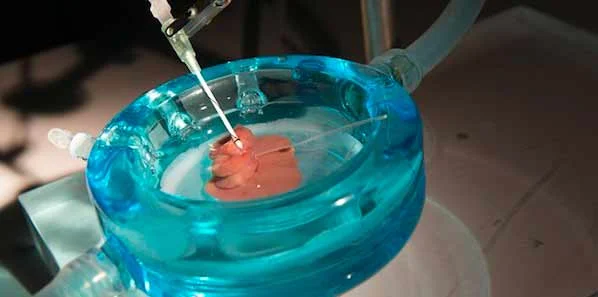A new technique that allows donated organs to remain healthy for up to four days before a transplant may one day increase the chances of patients finding a compatible match from a global pool of donors. According to new research conducted on rat livers, organs can be super-cooled to around 21 degrees Fahrenheit (-6 degrees Celsius), avoiding the damage that comes from freezing. The Harvard Medical School study appears in the journal Nature Medicine.
Prolonged Preservation
Human organs cannot be frozen without incurring irreversible damage to delicate tissues. However, without some type of cooling, donated organs rarely remain healthy for more than a day. The scientists involved in the current study injected rat livers with anti-freeze and a glucose compound, which allowed the organs to be saved for a prolonged period without actually freezing them to the -320.8 degrees Fahrenheit (-196 degrees) required for cryopreservation.
In the study, none of the rats, whose livers were transplanted using current methods, survived for at least three months. Meanwhile, all of the rats who received supercooled livers survived three months or more when the livers had been stored for three days or less. The survival rate for rats, whose supercooled livers had been stored for four days, was 58 percent.
Transplant Urgency
Organ transplants are time-sensitive, precisely because of the limited number of hours that tissue can remain healthy in storage. The technology currently used to preserve organs uses chemicals and cold temperatures, but 24 hours is considered the maximum time to transport the donated organs from donor to recipient. By having a wider window of time to transport the organ and to prepare patients and doctors for transplant surgery, the urgency of the operation is greatly reduced.
There are thousands of people on organ transplant lists. In Britain alone, 7,000 people are waiting, with half unlikely to find a matching donor in the current year. By 2015, approximately 1,000 people will die waiting for a transplant of some kind. The new storage technique therefore has the potential to save lives if it becomes safe for human donor organs.
Worldwide Allocation
There is a worldwide organ donor shortage, exacerbated by transportation times. Considering the larger distances that can be covered in four days compared to 24 hours, transcontinental transplants of donated organs will be facilitated by the new storage technique. With more organs available on a global level, patients are more likely to find a compatible match based on factors such as age, blood type and genotype.
Future research will have to focus on animals larger than rats, but the breakthrough is being welcomed as promising news by scientists. In addition to expanding the preservation time and geographic reach of donor organs, new possibilities will be allowed to emerge about how organs can be used to benefit patients.
Source: The Telegraph
Prolonged Preservation
Human organs cannot be frozen without incurring irreversible damage to delicate tissues. However, without some type of cooling, donated organs rarely remain healthy for more than a day. The scientists involved in the current study injected rat livers with anti-freeze and a glucose compound, which allowed the organs to be saved for a prolonged period without actually freezing them to the -320.8 degrees Fahrenheit (-196 degrees) required for cryopreservation.
In the study, none of the rats, whose livers were transplanted using current methods, survived for at least three months. Meanwhile, all of the rats who received supercooled livers survived three months or more when the livers had been stored for three days or less. The survival rate for rats, whose supercooled livers had been stored for four days, was 58 percent.
Transplant Urgency
Organ transplants are time-sensitive, precisely because of the limited number of hours that tissue can remain healthy in storage. The technology currently used to preserve organs uses chemicals and cold temperatures, but 24 hours is considered the maximum time to transport the donated organs from donor to recipient. By having a wider window of time to transport the organ and to prepare patients and doctors for transplant surgery, the urgency of the operation is greatly reduced.
There are thousands of people on organ transplant lists. In Britain alone, 7,000 people are waiting, with half unlikely to find a matching donor in the current year. By 2015, approximately 1,000 people will die waiting for a transplant of some kind. The new storage technique therefore has the potential to save lives if it becomes safe for human donor organs.
Worldwide Allocation
There is a worldwide organ donor shortage, exacerbated by transportation times. Considering the larger distances that can be covered in four days compared to 24 hours, transcontinental transplants of donated organs will be facilitated by the new storage technique. With more organs available on a global level, patients are more likely to find a compatible match based on factors such as age, blood type and genotype.
Future research will have to focus on animals larger than rats, but the breakthrough is being welcomed as promising news by scientists. In addition to expanding the preservation time and geographic reach of donor organs, new possibilities will be allowed to emerge about how organs can be used to benefit patients.
Source: The Telegraph
Latest Articles
transplantation, organ transplantation, organ donation, cryogenic storage, cryopreservation
A new technique that allows donated organs to remain healthy for up to four days before a transplant may one day increase the chances of patients finding a...










